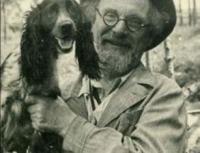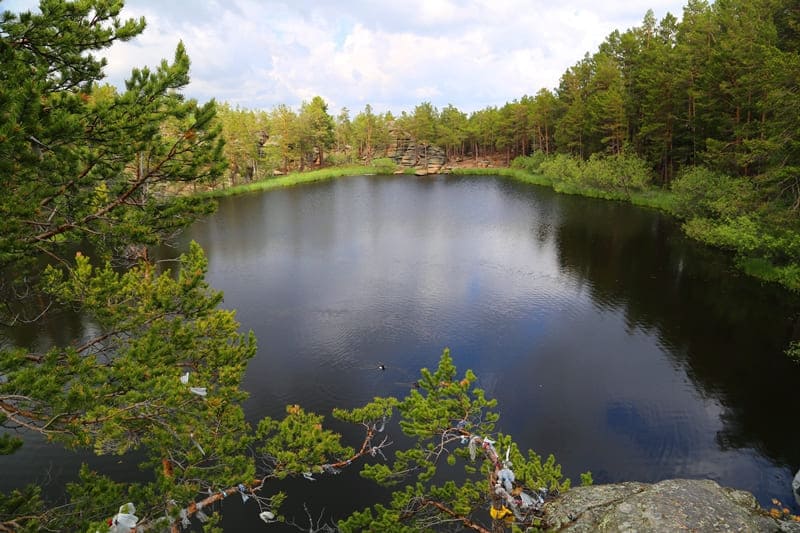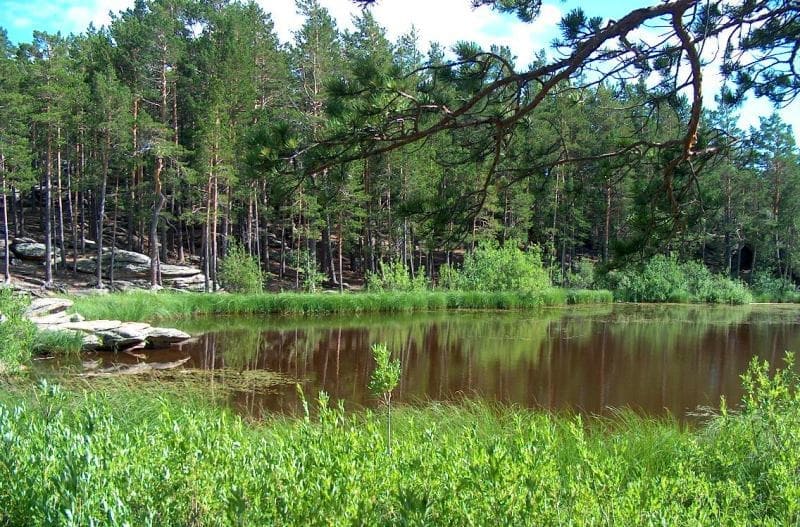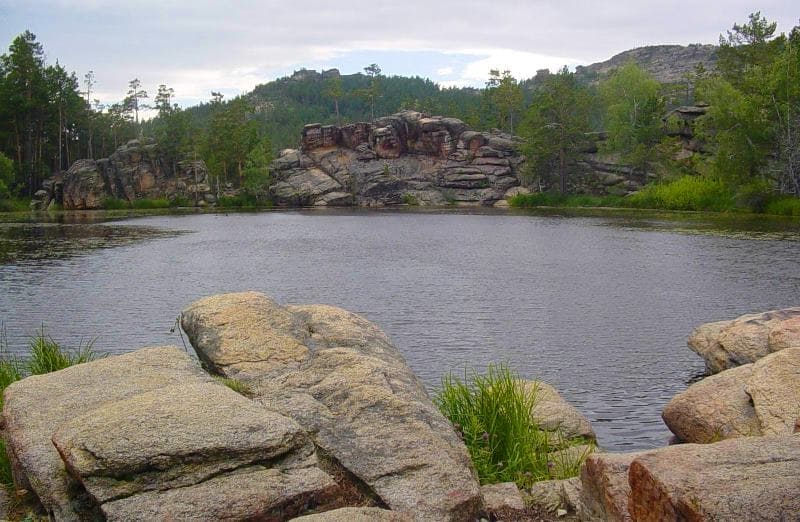You are here
M. Prishvin. "At Devil's Lake."

M. Prishvin's stories about Karkaraly Mountains.
"The host sends out aksakals with an invitation. A felt door. The host sits on the right side of the rug. Behind him is the hostess in a white headscarf. I notice butter and a sewing machine near her. We sit for a long time, waiting for the translator. The host points to an iron stove instead of a fire. A black cap on his graying head, a drooping mustache, half-closed eyes, as if sleeping, but in reality, calmly and cunningly thinking. As if sleeping, but in reality giving orders... The poet and the translator, the teacher and the children enter. They exchange greetings like foreign kings."
M. Prishvin. "At Devil's Lake." "Russkie Vedomosti." March 25, 1910.
Karkaraly Legends.
(Steppe Sketch).
I.
To avoid exhausting the horses in the long steppe, they trot at a measured pace from well to well. We ride as we should, and so it seems as if during the day the sun moves across the sky just like us, and at night the stars move just like us. The steppe beyond the Irtysh, heading toward Balkhash, is so flat at first, the road so smooth, that water in a bucket tied to a sledge doesn't splash.
If bad weather forces us to take shelter in a nomad's winter hut or in the lake's reeds, we make up for lost time on a moonlit night. Once, after such a night ride, our horizon didn't appear as regular as before. It seemed as if someone had clumsily cut away the frying pan-like circle of the horizon with scissors. Soon the steppe beneath us began to stir.
"Hark, Karat! Hark, Kulat!" we urged the horses from hill to hill. The steppe became undulating, like a sea in a swell, and the driving became uneven. We climbed higher and higher; each hill offered something new. And finally, the true steppe mountains appeared, like the swells of petrified and punished waves.
Here, salt still oozed onto the ground, whitening the road like snow. But fresh streams were already running down from the mountains, and a kind of tree stubble was beginning to appear along the edges. Higher up, pines stood on bare rocks, as if planted there.
Higher still, on broken cliffs, a real forest grew, and mountain lakes glittered. From here, far around, the yellow sea of steppe could be seen, and everywhere on it, similar mountains, like blue tents. It seemed as if we had arrived in the land of giants, wandering in these blue tents.
Nestled deep in one of these oases of fresh water and forest lay the small town of Karkaraly - a cluster of gray wooden houses, resembling granite fragments tumbled from the mountains. This is the land of the shepherds, Arka, which means "Spine of the Earth" in Kyrgyz - a blessed land just three letters short of a true Arcadia.
II.
I stopped at the post station near the square. A stone district administration building stood out from the row of houses, with two small cannons, against which a camel was rubbing itself. The square itself was filled with sheep, around which, right on the ground, sat Kyrgyz men, chatting and fondling their fat tails.
Riders surrounding the sheep and the men in robes seated on the ground occasionally dismounted and also fondled and patted the sheep. Handsome Sart traders, mullahs in turbans, women on wooden balconies, and pine trees on high cliffs cut into the September sky - all seemed to be conversing with the rams.
And they, with their hooked noses, offered their fat tails to everyone's attention. Toward evening, I left the post office building to walk into the mountains and look at it all from above. But the mountains only seemed close. I had also forgotten that it gets dark here faster than here.
I had just begun to climb when suddenly it grew dark, as if it had blinked, and above, near the tip of a rock resembling an eagle's beak, a star shone. I turned back, and as I entered the town, all the stars were in the sky; it had become completely dark.
It seems there is a second square in this town, and when I returned from the mountains, I probably found myself in this second one: there was no post office here. I darted from one end to the other; the milestone disappeared. What should I do? Everything was empty.
The windows were boarded up. There was no one to ask, since all the nomads had left for the steppe, and the settled inhabitants were unapproachable. I stopped and listened. Dogs barked in the city, wolves howled in the steppe, a bittern chirped in the lake reeds, and a knocker clanked.
I followed the knocking to look for the guard. But searching for a knocker on a dark street is like trying to catch a cricket in a wall by its sound. If the guard hadn't thought to rest astride the district government cannon, I would never have found him. He sat and knocked. I approached.
Another problem! I didn't know the Kyrgyz word for "post station."
- "Are your arms and legs healthy, and are your livestock healthy?" I said the usual greeting.
- "Amamba! Aman!" the Kyrgyz replied and asked about my livestock.
I followed his lead, asking in detail about the health of his sheep, horses, and camels. I told him everything about my livestock, using only two words: "amamba" and "aman," but I couldn't find out anything about the post station. Finally, he took me by the sleeve and dragged me into an alley. I saw the doors wide open and the hallway lit by a kerosene lantern.
- "Khosh," said the Kyrgyz, "farewell!"
- "Rakhmet," I replied, "thank you."
I entered this house to inquire about the post office, and in the dimly lit hall I saw a multitude of backs and brightly candlelit faces. Thus I found myself in the public meeting hall and became acquainted with the intelligentsia of the wild steppe and mountain oasis of Karkaraly.
III.
On the very first Sunday, the club members held a picnic in my honor in the mountains, where a very strange lake was hidden in the folds of rock. These granite boulders in the steppe mountains are so bizarre, so many cracks, passages, and turns, that rarely can anyone find this lake immediately.
Everyone wanders around, and everyone thinks, "The devil is leading the way," which is why they gave it the name "Devil's Lake." They say that a bishop, having visited Karkaraly, went with a priest and a deacon to bless the lake. But they, too, got lost and wandered off among the rocks in different directions.
They prayed with particular fervor and heard the whistle of a sandpiper. They followed the whistle and came to Devil's Lake. They held a thanksgiving service, blessed it, erected a stone cross on the mountain, and named it "Blessed Lake." That was long ago; the cross had since fallen into the water, and the lake remained known as Devil's Lake.
This time, the club members safely reached the mountaintop and, exhausted, sat down on the rocks near the lake, which looked very much like an artificially constructed swimming pool. A few dragonflies circled above the water. Below, beneath the dense coniferous forest, a butterfly fluttered, like a scrap of white paper.
Here and there, between the stern pines and towering rocks, birches faded in the September sun. How many half-ruined, fantastical castles were there, dozing figures, shifting like clouds: a fallen Mephistopheles, a kneeling woman with a prayer book in her hand, a toad, a camel, and huge, pot-bellied, bulging-eyed monsters - all dozing on the rock, and all slowly growing overgrown with pine trees like moss.
Somewhere in the distance, a blue cloud drooped toward the steppe. Somewhere, a salt lake gleamed. Our white-bearded Kyrgyz guide, an aksakal, lit a fire on the shore of Devil's Lake and began cooking mutton kuvardak. The club members, still tired, gazed down into the distance at the steppe.
"Let me borrow your umbrella," said the fat, good-natured secretary of the district congress to the assistant forester's wife.
- "What do you need it for?" asked the only lady among us. "I'll open it and fly with you," the good man replied.
Everyone laughed, imagining the secretary flying. They laughed and then fell silent.
- "You won't fly away!" sighed the salt lake keeper.
- "You won't fly away!" many of the officials replied.
Life was not happy for them in the oasis, around which, in the vast steppe, people still live, like Abraham, in tents, wandering with their herds.
- "You won't fly away!"
- "Great, great is Mother Steppe!" said the judge, the club's leader.
- "Please see."
The judge, wanting to quell the gloomy mood with a serious conversation, told how he travels to the Chu River when a murder occurs there. The person reporting the incident travels for a month to see the judge. The following month, the judge himself travels.
A herd of replacement horses and camels with water is driven after him. The investigating judge arrives at the scene and sees only bones.
- Why go?
- The law.
In this country, a judge serves only the pure idea of law. There, by the Chu River, live herds of wild boar; tigers roam the reeds. The judge's tent is guarded, dug around to keep out phalanxes and scorpions. Snowstorms can always bury the judge.
Danger at every step. But with what great triumph the club members greet their leader when he appears unharmed at the beginning of the fourth month after the murder.
- A fairytale land! I exclaimed, wondering where a Russian could travel without leaving his own borders. "A fantastic country!"
- "It's all very simple!" said the judge.
- "Tigers..."
- "Ordinary tigers."
- "Pheasants, wild horses..."
- "And that's all very common."
- "Nomads, like in the Bible, now, in our time..."
- "Huh? Well, so what? And it's all very simple."
- "You get used to everything," sighed the assistant forester's wife.
- "Habit is a gift from above," sang Singer's agent, a traveler, always trying to catch up with his fading mustache.
They were silent. A prairie pigeon, not noticing the assembled people, flew to the Devil's Lake to drink, and suddenly swooped back down into the steppe, flickering its wings, and then vanished.
- "He's gone!" said the keeper of the salt lake, a very sad man.
The picnic was not going well. I asked our lady if they danced at the club.
- "Not much," she replied. "Those who want to live leave here; they're all ugly, they dance little, and somehow, nothing ever goes right for them."
- "One word: Karkaraly," said the prosperous assistant to the district chief.
- "Why, my dear fellow, this is the same old Tartarus, only worse; I came here like I was trapped."
- "What does that word mean?" I asked the club members. No one knew.
- "Do you know, aksakal?" we asked an old Kyrgyz by the fire.
- "Karkara," he replied, "means black feather; in these mountains, the beautiful Bayan left a black feather from her headdress."
- "What Bayan? Tell me!" the club members began to speak.
- "Do you see these blue mountains?" the old man asked.
- "We see, we see," we replied. "Beyond these mountains are more blue mountains, and beyond those mountains are five more blue mountains." On the last mountain, Karybai and Sarybai saw a pregnant goat.
- "Listen, my dear," said Karybai, "my wife is pregnant, I will not shoot this goat."
- "And you listen, my dear," replied Sarybai, "my wife is pregnant too, and I will not shoot a pregnant goat."
Karybai and Sarybai did not shoot the pregnant goat and swore: if the children were boys, they would be brothers; if girls, they would be sisters; if a boy and a girl, they would be bridegroom and bridegroom.
- "Dzhaksy?" asked the old man.
- "Dzhaksy, aksakal," the teacher approved.
- "Very, very interesting," the assistant forester's wife approved.
The old man continued.
- "Do you see that valley with the dry river?"
- "We see it," we replied. "There goes a camel caravan. I see a flock of black starlings flying ahead of it." Karybai and Sarybai saw a black starling descending from the sky toward them.
- "My soul," said Karybai, "this is God's messenger.
He foretells life for us. Do you see the horsemen approaching; do you hear them calling to us?"
- "I hear, my soul, I hear," replied Sarybai, "they are calling to us that children have been born. But look, God's messenger has landed on my shoulder. A black starling foretells both life and death." Sarybai spoke, his horse stumbled, the rider fell on a rock, and died.
Karybai became frightened, took his daughter, and rode away from Sarybai's widow. But as he rode away, a flock of black starlings flew ahead of his camels. Do you see the black birds?"
- "We see them. Go on, aksakal!" "The bride's name was Bayan-Slu," the old man continued, "and the groom's was Kozu-Korpech. They lived far apart and grew up. He became a hero, she a beauty. The best suitors proposed to marry Bayan, but she said:
"I have a suitor; he will come when his golden braid grows long."
And so, wandering with her herds, Bayan left him marks: in the Altyn-Tarak Mountains, she left a golden comb; in our Karkaraly Mountains, she left a black feather from her headdress. Jaxes?" "Very," even the judge approved.
- "Wonderful," the others said, "how come we didn't know anything about it before? So that's what Karkaraly means. Well, what next?"
- "Next. Do you see those spots in the valley? What are they?"
- "Herds."
- "No, those are sheep." Bayan had many sheep and goats. A young shepherd hired himself out to her as a herdsman for her sheep and goats. He tended them well, and the flock multiplied. Bayan fell in love with this young shepherd. She fell deeply in love.
But one day, her favorite goat broke its leg. Bayan became angry and hit the shepherd on the head. The cap fell, revealing a golden braid. The young shepherd was Kozu-Korpech. Jax?
- Further!
- When the Kyrgyz hero Kozu-Korpech lay down to rest in the Chok-Terek Valley, the evil Kalmyk hero Kudar-Kul killed him, took his head, and gave it to the beautiful Bayan. The bride came with the groom's head to the Chok-Terek Valley and prayed to God to resurrect him for three days. Kozu-Korpech was resurrected, and the bride remained with him as his wife for three days in the Lonely Poplar Valley, Chok-Terek. Jax?
- Further, further!
- Further: before the third dawn, the hero Kozu-Korpech died. Bayan swore vengeance. She promised to marry the Kalmyk hero and asked him only to fetch water from a deep well. She lowered her braid into the well, and when the warrior climbed down it, she filled the well with earth.
She promised to marry a passing caravan leader if he built a high grave over Kozu-Korpech and threw himself into it. The caravan leader threw himself down and died. She promised to marry all the brave young men in the caravan if they dared to throw themselves down.
And they all threw themselves down and died. Then she entered the grave of her fiancé, Kozu-Korpech, and stabbed herself with a dagger.
- "Is that all, aksakal?"
- "That's all," the old man replied. "Just look at those distant blue mountains. Do you see? Beyond those mountains, there are ten more mountains and then a flat steppe. The grave of Bayan-Slu and Kozu-Korpech still stands there by the road."
- "So is all this true?" we asked.
- "One!" the old man replied.
- "All this is true."
IV.
The club members perked up. The land of Ark, the backbone of the land that shepherds consider the best country in the world, was right next to us.
- "The steppe is such a thing," said the secretary of the district congress.
- "Where else on earth is such a place? Here I am, just as I am, I'll take a whip, mount my horse, and disappear, and I know I won't die. Everyone will take me in, whether I live for a week or two."
- "At least a month!" said Singer's agent.
- "At least a year!" exclaimed the teacher.
- "Live as long as you like," everyone began to talk, recalling the story of the political exile, how he lived in a small town and then suddenly went into the steppe and disappeared.
- "Perhaps he's dead?" I asked.
- "Alive!" everyone said.
"There is such a country where you can be and not be," we thought. Kuvardak had finally arrived; we uncorked the bottles, clinked glasses; the joyful mood grew. Beyond these blue mountains lies the land of Arka.
"There!" the salt lake keeper, already tipsy, exclaimed enthusiastically.
- "There, there!" we clinked glasses.
- "Gentlemen, who revealed this to us?" said the assistant forester's wife, pointing at me.
- "But this is our guest; he was the first to ask the aksakal what Karkaraly means."
- "To your health!" we clinked glasses with me.
- "Refreshing, very, very refreshing! Gentlemen, we'll ask the guest to write his name on the stone."
- "Of course!"
- "Excuse me, gentlemen, I only have an ordinary pencil, and the rocks are so big."
- "We'll enlarge it!"
- "Hunting, traveling!" the kindly fat man exulted, looking at me rapturously.
- "Gentlemen, are we really going back to the club to roll balls and play cards?"
- "That's right," the hunters chimed in, "they'll beat you and you won't be able to sleep it off. And after going hunting, you'll come back refreshed."
"And the best thing, gentlemen," said the teacher, "is to read a book."
"Refreshed, very, very refreshed!".
All in all, the picnic went well. Supporting each other and following the sober club leader, we safely descended into the depths of the oasis.
Notes.
- First published: "Russkie Vedomosti," March 25, 1910.
- Drozhin - a longitudinal beam on a wagon.
- ...Singer's agent, a voyager, began singing... - a sales representative of the US electrical company "Singer," founded in 1863, which traded in sewing machines, textile equipment, furniture, etc.



Authority:
Collected Works. In 8 volumes M. M. Prishvin; Editorial Board: V.V. Kozhinov and others (Introductory article by V.D. Prishvina, Commentary by A.L. Kiselev and V.F. Domogatsky). Volume 1. - Moscow: Khudozh. lit., 1982. - 21 cm. Page 724 - 731.
Photos by:
Alexander Petrov.







